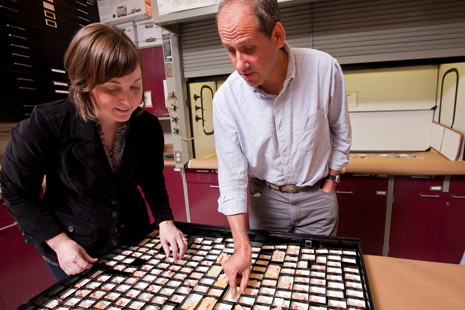
FAYETTEVILLE, Ark. – A University of Arkansas professor and his colleagues have found the first direct evidence in the fossil record that Homo erectus ate a more diverse diet than its relative Homo habilis.
“This is the very first evidence from the fossils themselves of a broadened subsistence base in our family tree,” Ungar said. “Homo erectus seems to be where it started.”
Ungar, University of Arkansas graduate student Kristin L. Krueger and colleagues at Rutgers University and Berkeley report their findings in the Journal of Human Evolution.
The researchers examined the dental microwear of teeth from several specimens of Homo habilis found at Olduvai Gorge between 1995 and 2007 excavated by a team from Rutgers University led by Robert J. Blumenschine. The specimens collected for this species and for Paranthropus boisei brought the sample sizes in line with those of other hominins. Sample size matters because small numbers mean less confidence that the results represent the variation within a species.
“By adding 5 new Homo habilis specimens we now have 10 for Homo habilis and 8 for Homo erectus and we can actually separate them out” in terms of the dental microwear, Ungar said.
The researchers used a technique developed by Ungar and his colleagues that combines engineering software, scale-sensitive fractal analysis and a scanning confocal microscope to create a reproducible texture analysis for teeth. The researchers looked at both complexity, the roughness at varying scales, and directionality in the teeth they examined. Hard foods like nuts and seeds tend to lead to more complex tooth profiles, while tough foods like leaves or meat lead to more scratches, which corresponds with directionality.
Because of the increased sample size, researchers were able to compare the pits, scratches and complexity of the wear on the H. habilis teeth with the wear on H. erectus teeth.
“If we compare Homo erectus to Homo habilis, we see a marked increase in variation in the former,” Ungar said. The H. habilis fossil teeth show lots of light scratches but little pitting, indicating that it ate plant material. The variation in the H. erectus teeth suggests that this species probably ate a broader range of foods.
“This represents a change to a more human-like diet,” Ungar said. “It indicates a broader resource base.”
Anthropologists have shown that, unlike earlier hominins, Homo erectus moved out of Africa, developed more sophisticated tools, spent most of its time on the ground and had smaller teeth with thin tooth enamel. The fossil evidence for a more diverse diet fits in with this, Ungar said.
“The evidence suggests that Homo erectus represents a new phase in human evolution,” Ungar said.
Topics
Contacts
Peter Ungar, Distinguished Professor of anthropology
J. William Fulbright College of Arts and Sciences
479-575-6361,
Melissa Blouin, director of science and research communication
University Relations
479-575-3033,